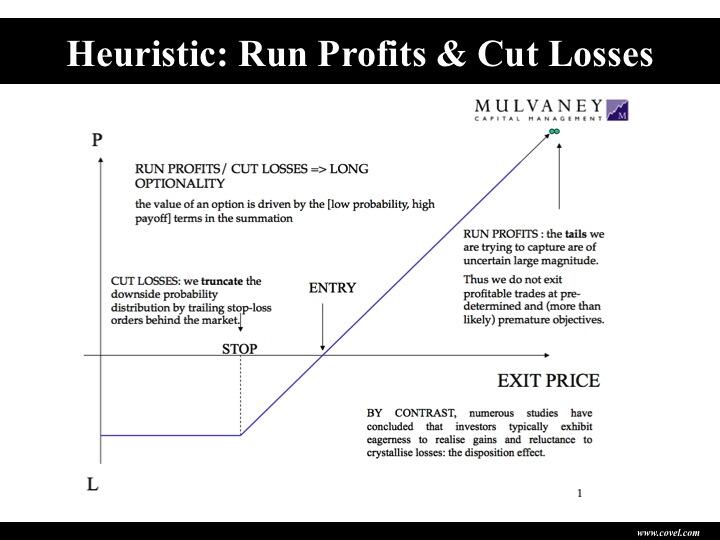- “The creation of bad trades is easy: trade your opinion, trade big, don’t cut your losses, just hold on and hope. Bad trades fight trends; they put out a lot money with the risk of making little. The entry and exit signals for bad trades are hope and fear, with the ego stepping in and refusing to honor the stop loss.”
- “Dramatic and emotional trading experiences tend to be negative; pride is a great banana peel, as are hope, fear, and greed. My biggest slipups occurred shortly after I got emotionally involved with positions.” -Ed Seykota
- A good trade is taken with complete confidence and follows your trading method; a bad trade is taken on an opinion.
- A good trade is taken with a disciplined entry and position size; a bad trade is taken to win back losses the market owes you.
- “Ninety-five percent of the trading errors you are likely to make–causing the money to just evaporate before you eyes–will stem from you attitudes about being wrong, losing money, missing out, and leaving money on the table.” -Mark Douglas
- A loss is not when I lose money; it’s when I don’t follow my plan
- Turn down the heat when you are getting smoked (pare back position size, trade smaller in a drawdown)
- A good trade is taken when your entry parameters line up; a bad trade is taken out of fear of missing a move
- A good trade is taken to be profitable in the context of your trading plan; a bad trade is taken out of greed to make a lot of money quickly.
- A good trade is taken according to your trading plan; a bad trade is taken to inflate the ego.
- A good trade is taken without regret or internal conflict; a bad trade is taken when a trader is double-minded.
Archives of “January 2019” month
rss“Vanity, one’s own personal vanity, is probably the greatest single enemy to stock market success…."

Difference between a boss and a LEADER !

Samsung's "Safety Truck" allows drivers to see the road ahead before passing
Best newspaper editing ever

Bankers never learn

The reason for the Recession — simplified.
A naked and drunken woman boards a cab in London one night.
The Gujju driver keeps staring and does not start the cab.
Woman : Haven’t you ever seen a naked woman before ???
Gujju Driver : I am not staring at you lady ….. just wondering where you kept money to pay !!
The Moral : That is what most of the American and European banks failed to do. (i.e.) Assessing repayment capacity before taking exposure !!!
Long live Gujju enterprise…
Perfect cartoon for low information voters I would have finished, "and you know who you are" but they probably don't

4 Quotes from Michael Marcus
You have to learn how to lose; it is more important than learning how to win. If you think you are always going to be a winner, when you lose, you will develop feelings of hostility and end up blaming the market instead of trying to learn why you lost. If trading is your life , it is a torturous kind of excitement. But if you are keeping your life in balance, then it is fun. All the successful traders I’ve seen that lasted in the business sooner or later got to that point. They have a balanced life; they have fun outside of trading. You can’t sustain it if you don’t have some other focus. Eventually, you wind up over trading or getting excessively disturbed about temporary failures. I think the leading cause of financial disablement is the belief that you can rely on the experts to help you. It might, if you know the right expert….Typically, however, these so-called “experts” are not traders. Your average broker couldn’t be a trader in a million years. More money is lost listening to brokers than any other way. Trading requires an intense personal involvement. You have to do your own homework, and that is what I advise people to do. Perhaps the most important rule is to hold on to your winners and cut your losers. Both are equally important. If you don’t stay with your winners, you are not going to be able to pay the losers. |
Only 5% of Traders are Able to Do This



